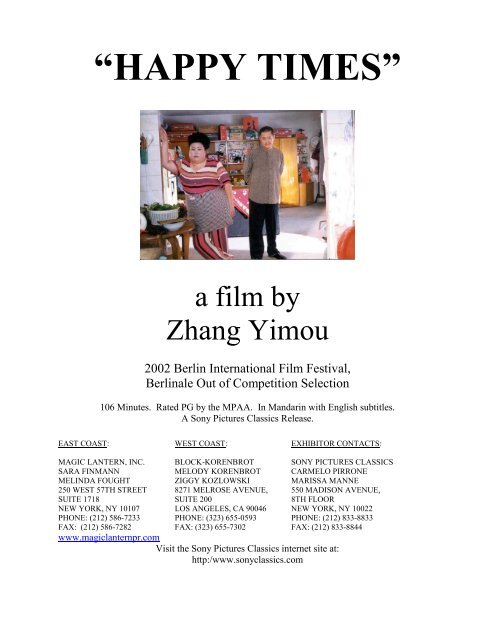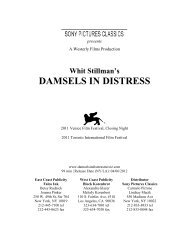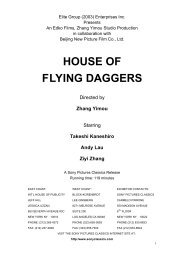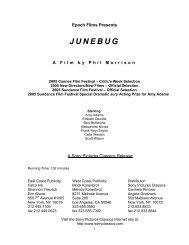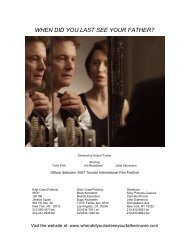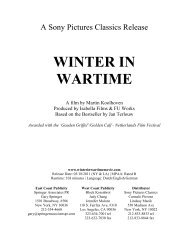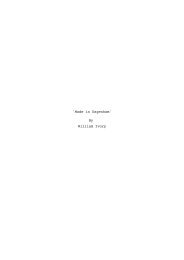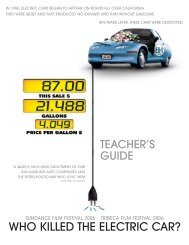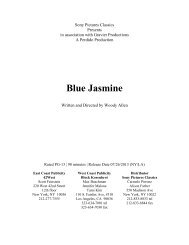download presskit - Sony Pictures Classics
download presskit - Sony Pictures Classics
download presskit - Sony Pictures Classics
Create successful ePaper yourself
Turn your PDF publications into a flip-book with our unique Google optimized e-Paper software.
“HAPPY TIMES”<br />
a film by<br />
Zhang Yimou<br />
2002 Berlin International Film Festival,<br />
Berlinale Out of Competition Selection<br />
106 Minutes. Rated PG by the MPAA. In Mandarin with English subtitles.<br />
A <strong>Sony</strong> <strong>Pictures</strong> <strong>Classics</strong> Release.<br />
EAST COAST: WEST COAST: EXHIBITOR CONTACTS:<br />
MAGIC LANTERN, INC. BLOCK-KORENBROT SONY PICTURES CLASSICS<br />
SARA FINMANN MELODY KORENBROT CARMELO PIRRONE<br />
MELINDA FOUGHT ZIGGY KOZLOWSKI MARISSA MANNE<br />
250 WEST 57TH STREET 8271 MELROSE AVENUE, 550 MADISON AVENUE,<br />
SUITE 1718 SUITE 200 8TH FLOOR<br />
NEW YORK, NY 10107 LOS ANGELES, CA 90046 NEW YORK, NY 10022<br />
PHONE: (212) 586-7233 PHONE: (323) 655-0593 PHONE: (212) 833-8833<br />
FAX: (212) 586-7282 FAX: (323) 655-7302 FAX: (212) 833-8844<br />
www.magiclanternpr.com<br />
Visit the <strong>Sony</strong> <strong>Pictures</strong> <strong>Classics</strong> internet site at:<br />
http:/www.sonyclassics.com
HAPPY TIMES<br />
Cast<br />
Zhao<br />
Wu Ying<br />
Stepmother<br />
Little Fu<br />
Li<br />
Wu Ying’s Stepbrother<br />
Old Niu<br />
Aunty Liu<br />
Lao Zhang<br />
Lao Bai<br />
ZHAO BENSHAN<br />
DONG JIE<br />
DONG LIHUA<br />
FU BIAO<br />
LI XUEJIAN<br />
LENG QIBIN<br />
NIU BEN<br />
GONG JINGHUA<br />
ZHANG HONGJIE<br />
ZHAO BINGKUN<br />
Filmmakers<br />
Director<br />
Writer<br />
Producers<br />
Executive Producers<br />
Co-Producer<br />
Director of Photography<br />
Sound<br />
Editor<br />
Composer<br />
Art Director<br />
Costume Designer<br />
ZHANG YIMOU<br />
GUI ZI<br />
ZHAO YU<br />
YANG QINGLONG<br />
ZHOU PING<br />
ZHANG WEIPING<br />
EDWARD R. PRESSMAN<br />
TERRENCE MALICK<br />
WANG WEI<br />
ERIN O’ROURKE<br />
HOU YONG<br />
WU LAIA<br />
ZHAI RU<br />
SAN BAO<br />
CAO JIUPING<br />
TONG HUARNIAO<br />
Based on the Novella by MO YAN<br />
“Shifu, You’ll Do Anything for a Laugh”<br />
“Happy Times” is a Guangxi Film Studios, Zhu Hai Guo Gi Enterprise Development Company<br />
and Beijing New Picture Distribution Company Production.<br />
* * *<br />
2
HAPPY TIMES<br />
Synopsis<br />
“Happy Times,” the second of Zhang Yimou’s films set in a modern city, is a bittersweet<br />
comedy.<br />
Zhao (Zhao Benshan) is a poor, aging bachelor who hasn’t had luck in love. Thinking he has<br />
finally met the woman of his dreams, he leads her to believe he is wealthy and agrees to a<br />
wedding far beyond his means. Desperate for funds, he turns to his friends, who are weary of his<br />
fanciful schemes. Zhao’s best friend (Li Xuejian) hatches the idea to raise the money by<br />
refurbishing an abandoned bus they will rent out by the hour—the “Happy Times Hotel”<br />
—to young couples starved for privacy. But this plan goes awry when Zhao is too old-fashioned<br />
to allow the couples to have the privacy they are looking for. No one will pay for the “Happy<br />
Times Hotel” if they can’t shut the door.<br />
While dining with his intended spouse, Zhao is introduced to her spoiled son (Ling Qibin) and<br />
blind stepdaughter Wu Ying (Dong Jie). The stepmother sees Wu as nothing but a burden to her<br />
and her son since she and her father divorced. Sad and lonely, Wu is interested in only one<br />
thing: the prospect of her father coming to take her to Shenzhen so she can have an operation to<br />
fix her eyes.<br />
To be rid of Wu, the stepmother insists that Zhao take her to the “Happy Times Hotel”<br />
and give her a job. Zhao and Wu reluctantly agree to this arrangement, but when they arrive at<br />
the bus, Zhao sees the bus being hauled away to the dump. Not knowing what to do next, he<br />
brings Wu back to his home and promises her a job at the hotel once it is completed.<br />
Zhao and Wu return to her stepmother’s home to find that she has sold Wu’s belongings and<br />
given her room to her son. She once again insists that Zhao find Wu a job, and informs Zhao<br />
that Wu is a good masseuse. As Zhao’s compassion increases for Wu, he decides to maintain the<br />
lie that he is a wealthy hotel manager. To continue this ruse, he once again enlists the help of his<br />
friends to build a makeshift “massage room” in an abandoned warehouse, “another one of his<br />
hotels.” Here everyone perpetuates the deception further by pretending to be customers for Wu,<br />
as they tip her generously with Zhao’s money.<br />
When Zhao runs out of this tip money, things start to unravel. A plot is developed to use rice<br />
paper, which has the feel of real money, to give to Wu. Everyone feels the situation could go on<br />
forever until Wu notices something strange about the “massage parlor.” She begins to<br />
investigate and comes to the realization that everything around her is fake. Simultaneously,<br />
Zhao feels he cannot continue this deception and is compelled to tell Wu the truth and to come<br />
clean with his fiancé, who he discovers has been cheating on him and is about to be married to<br />
another man—a rich one.<br />
As the film reaches its poignant conclusion, both Zhao and Wu’s actions demonstrate the strong<br />
bond that has developed between them.<br />
* * *<br />
3
HAPPY TIMES<br />
About the Director<br />
ZHANG YIMOU (Director), born in Xian, China in 1950, was in secondary school when the<br />
Cultural Revolution erupted in 1966. His studies were suspended and he was sent to work in the<br />
countryside in 1968, first on farms in Shanxi Province for three years, and from 1971 to 1978 as<br />
a laborer in a spinning mill. Interested in art and photography from an early age, Zhang pursued<br />
a hobby as a still photographer despite the scarcity of books and materials or the chance for his<br />
work to be published.<br />
When the Beijing Film Academy held a nation-wide examination in 1978, Zhang enrolled and<br />
passed with high marks but was rejected because at age 27, he was five years beyond the<br />
accepted age limit. After two unsuccessful trips to Beijing to repeal the decision, he wrote<br />
directly to the Minister of Culture, pleading his case on the grounds that he had wasted ten years<br />
because of the Cultural Revolution. Two months later, he was accepted to study in the Film<br />
Academy's Department of Cinematography.<br />
After graduating in 1982, he was assigned to work in the Guangxi Film Studio. In 1985 he<br />
moved to the Xian Film Studio and worked as a cinematographer on such films as “One and the<br />
Eight” (1982), directed by Zhang Junchao, “Yellow Earth” (1983) and “The Big Parade” (1985),<br />
both directed by Chen Kaige.<br />
Zhang made his directorial debut in 1988 with “Red Sorghum,” starring Gong Li in her first film<br />
role. The film won the Golden Bear Award for Best Picture at the 1989 Berlin Film Festival. He<br />
went on to direct several more films with Gong Li including “Ju Dou” (1990) which was<br />
nominated for an Oscar in 1991; “Raise the Red Lantern” (1991) which was awarded the Silver<br />
Lion at the Venice Film Festival and was also nominated for an Academy Award; “The Story of<br />
Qiu Ju” (1992) which won the Golden Lion at the 1992 Venice Film Festival; “To Live” (1994)<br />
which won the Grand Jury Prize and Best Actor Award at the 1994 Cannes Film Festival; and<br />
“Shanghai Triad,” which was an Official Selection in Cannes in 1995 and received the Best<br />
Foreign Language Film prize from the National Board of Review. “Keep Cool” was further<br />
premiered in competition in Venice in 1996. In 1997 he directed the Puccini opera “Turandot”<br />
in Florence, Italy with Zubin Mehta serving as conductor. In 1998, he and Mehta once again<br />
collaborated on a re-staging of the opera in Beijing's Forbidden City.<br />
“Not One Less” was awarded the coveted Golden Lion, the top prize of the Venice Film Festival<br />
in 1999. “The Road Home,” starring Zhang Ziyi, won the Silver Bear at the 2000 Berlin Film<br />
Festival and the Audience Award at the 2001 Sundance Film Festival. His upcoming film,<br />
“Hero,” stars Maggie Cheung, Jet Li, Tony Leung and Zhang Ziyi with music by Tan Dun.<br />
* * *<br />
4
HAPPY TIMES<br />
About the Cast<br />
ZHAO BENSHAN (Zhao) was born in 1958. He was originally a folk theater actor in Liao<br />
Ning Province and has received several awards in the field.<br />
From 1990, Zhao Benshan started performing in the CCTV (China Central Television) special<br />
program for Chinese New Year’s Eve. He became very famous nationwide, and his performance<br />
is a huge success year after year. It has been a must-see for the past decade. He also wins top<br />
awards every year and is considered an A-list actor in China.<br />
Zhao Benshan has also appeared in many films and telefilms as an actor. In 1999, he won the<br />
Hundred Flower Best Actor Award (the winner is selected by the audience) for his role in the<br />
film, “Male Director for Female Affairs.”<br />
DONG JIE (Wu Ying) went to Beijing Dance Academy at the age of 10. When she was 15<br />
years old, she was chosen by the professional dance group in Guangzhou and started her career<br />
as a professional dancer. “Happy Times” is her first feature film.<br />
* * *<br />
5
HAPPY TIMES<br />
About the Filmmakers<br />
GAI ZI (Writer) graduated from the Xibei University in China. He was Executive Vice Chief<br />
Editor of “Li Jiang,” a very important Chinese literary publication. In recent years, he has<br />
published several novels, among them The River Wetter By Rain and The Sleepy Girl in the<br />
Morning. He is one of the representative figures of the young generation of contemporary<br />
Chinese literature.<br />
ZHAO YU (Producer) is the Head of Guangxi Film Studios.<br />
ZHOU PING (Producer) is the Managing Director of the Zhu Hai Guo Gi Enterprise<br />
Development Company, which financed the film. “Happy Times” is her first foray into film<br />
production.<br />
ZHANG WEIPING (Producer) is the Managing Director for Beijing New <strong>Pictures</strong> Distribution<br />
Company. He has produced and co-produced Zhang Yimou’s “Keep Cool,” “Not One Less” and<br />
“The Road Home.”<br />
EDWARD R. PRESSMAN (Executive Producer) With over 60 diverse motion pictures to his<br />
credit, native New Yorker Pressman has brought many emerging filmmakers together with<br />
projects that have put them on the map, such as: Oliver Stone’s “The Hand,” David Byrne’s<br />
“True Stories,” Brian De Palma’s “Sisters” and “Phantom of the Paradise,” Terrence Malick’s<br />
“Badlands,” Alex Proyas’ “The Crow” and Sylvester Stallone’s “Paradise Alley.” On the<br />
international front, Pressman served in much the same capacity, with projects such as: Rainer<br />
Werner Fassbinder’s first English language film “Despair,” the Taviani Brothers’ “Good<br />
Morning Babylon.” Pressman was crucial in bringing Wolfgang Peterson’s “Das Boot” to the<br />
big screen in America, as he also fostered David Hare’s “Paris By Night” and Bo Widerberg’s<br />
“Victoria.”<br />
Pressman has produced many other films, including: Paul Williams’ “Out Of It,” “The<br />
Revolutionary” and “Dealing,” Joan Tewkesbury’s “Old Boyfriends,” John Byrum’s<br />
“Heartbeat,” John Milius’ “Conan the Barbarian,” Fred Schepisi’s “Plenty,” Sam Raimi’s<br />
“Crimewave,” “Cherry 2000,” Alex Cox’s “Walker,” Oliver Stone’s “Wall Street” and “Talk<br />
Radio,” Kathryn Bigelow’s “Blue Steel,” Chris Monger’s “Waiting For The Light,” Charles<br />
Burnett’s “To Sleep With Anger,” Barbet Schroeder’s “Reversal of Fortune,” David Mamet’s<br />
“Homicide,” John Frankenheimer’s “Year Of The Gun,” Mark Frost’s “Storyville,” Abel<br />
Ferrara’s “Bad Lieutenant,” “The Blackout” and “New Rose Hotel,” Danny DeVito’s “Hoffa,”<br />
Nicholas Kazan’s “Dream Lover,” Danny Cannon’s “Judge Dredd,” Harold Becker’s “City<br />
Hall,” “The Island of Dr. Moreau,” Alan Rickman’s “The Winter Guest,” James Toback’s “Two<br />
Girls and a Guy” and “Black and White,” Leslie Woodhead’s “Endurance,” a production with<br />
Terrence Malick that inspired the formation of Sunflower (not to be confused with the other<br />
Shackleton project), Peter MacDonald’s “Legionnaire,” Mary Harron’s “American Psycho” and<br />
Bharat Nalluri’s “The Crow: Salvation.” Pressman recently served as executive producer of<br />
George Butler’s “Shackleton: The Endurance,” and Richard Kwietniowski’s “Owning<br />
Mahoney,” starring Philip Seymour Hoffman, Minnie Driver and John Hurt.<br />
6
Pressman attended New York’s Fieldston School, and graduated with honors from Stanford<br />
University with a B.A. in Philosophy. He pursued graduate studies at the London School of<br />
Economics. American Film magazine named Pressman the Best Producer of the 1980s. In 1991<br />
he received the John Cassavetes Award from the Independent Feature Project/West for his<br />
outstanding body of work and his contributions to independent filmmaking. He was also<br />
awarded the Chevalier Des Arts et Lettres medal. Pressman serves on the Advisory Board of the<br />
Independent Feature Project/West, on the Board of Trustees of the Public Theater/New York<br />
Shakespeare Festival, and on the Board of Directors of New York’s Film Society of Lincoln<br />
Center.<br />
In the fall of 2001 Pressman, in partnership with John Schmidt, launched ContentFilm, a new<br />
fully-financed production and distribution company. The company, will finance, produce and<br />
distribute an initial slate of twelve to fifteen feature films to be shot mainly on digital video.<br />
Pressman serves as Chairman/CEO of the new company; Schmidt serves as President/COO.<br />
ContentFilm has greenlit a number of high-profile projects, including “The Cooler,” “Party<br />
Monster” and “The Hebrew Hammer.” In addition, the company acquired worldwide rights to<br />
Larry Fessenden’s “Wendigo,” working with Magnolia <strong>Pictures</strong> on the film’s domestic release.<br />
“Happy Times” is the first film to be produced by Sunflower Productions, a company formed by<br />
Pressman, Terrence Malick and <strong>Sony</strong> <strong>Pictures</strong> <strong>Classics</strong>.<br />
TERRENCE MALICK (Executive Producer) was born in Ottawa, Illinois, and grew up in<br />
Texas and Oklahoma. He graduated from the American Film Institute, and has directed three<br />
films: “Badlands” (1973), “Days of Heaven” (1978) and “The Thin Red Line” (1998).<br />
HOU YONG (Director of Photography) was Zhang Yimou’s classmate in the cinematography<br />
class at the Beijing Film Academy. He has worked on such films as: “The Day the Sun Turned<br />
Cold” by Hong Kong director Yim Ho and Tian Zhuanghunag’s “Horse Thief” and “The Blue<br />
Kite.” This is his third film with Zhang Yimou, following “Not One Less” and “The Road<br />
Home.”<br />
WU LAIA (Soundman) is a graduate of the Beijing Film Academy in Sound. His previous<br />
films include: “East Palace, West Palace” by Zhang Yuan, “Eighteen Springs” by Hong Kong<br />
director Ann Hui, “Spicy Love Soup” by Zhang Yang, and “Not One Less” and “The Road<br />
Home” by Zhang Yimou.<br />
ZHAI RU (Editor) is originally from Beijing and worked as continuity on the films “In the Heat<br />
of the Sun” by Jian Wen, “Temptress Moon” by Chen Kaige and Zhang Yimou’s “Keep Cool,”<br />
“Not One Less” and “The Road Home.”<br />
SAN BAO (Composer) was born in Beijing in 1968 and is a graduate of the Beijing Music<br />
Institute. He has worked as composer on the films “The Divorce” and “Be There or Be Square.”<br />
CAO JIUPING (Art Director) graduated from the Xian Art Institute in 1982, and has worked<br />
on all of Zhang Yimou’s films.<br />
* * *<br />
7


